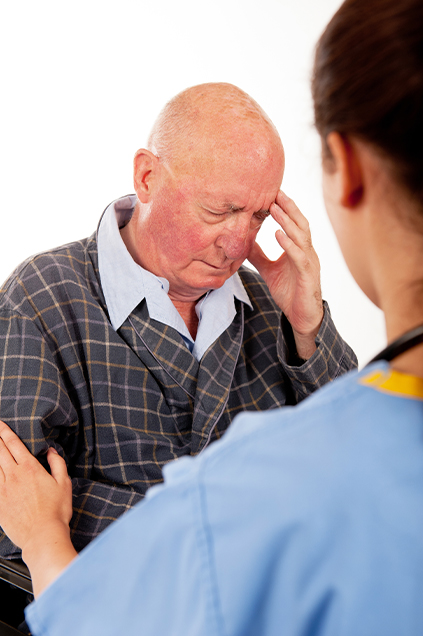
NO RECOVERY NO FEE Free Case Review
Los Angeles Lawyers for Delayed Treatment for Strokes
Tough representation for seniors who fail to receive life-saving stroke treatments in California
Strokes are a leading cause of fatalities in the United States. Seniors who fail to receive prompt medical care may become paralyzed, have communication problems, and suffer from types of brain injuries. Senior survivors with disabilities may need to live their remaining years in a nursing home or a long-term care facility. With prompt medical care, many deaths and severe disabilities can be avoided. Nursing homes and private caretakers should plan ahead for the possibility of a stroke. A delay of even an hour can mean the difference between a full recovery and a lifetime of struggles – or death.
More than 16 percent of deaths due to heart disease are due to strokes, according to the US Centers for Disease Control and Prevention (CDC), about 795,000 people die from strokes each year. About 1 in 4 fatal stroke victims had a prior stroke. At Garcia & Coman, our California delayed stroke attorneys work with cardiologists and other physicians to show why strokes happen, why delays in treatment are dangerous, and every way a stroke makes a senior’s life extremely difficult. We hold caretakers, nursing homes, and hospitals liable for unprofessional care.
NO RECOVERY NO FEE Free Case Review
How can we help?
- What is a stroke?
- What are the common signs and symptoms of strokes in Los Angeles?
- Why are prompt diagnosis and treatment for strokes so critical?
- What are the causes of stroke treatment delays in Los Angeles?
- How do your lawyers fight for victims of delayed stroke treatment in California?
- Do you have a delayed stroke treatment lawyer near me?

What is a stroke?
There are two types of strokes, ischemic and hemorrhagic strokes. The large majority of strokes are ischemic strokes. According to Johns Hopkins University, these strokes have the following characteristics:
- Ischemic strokes. These strokes occur when the blood doesn’t receive enough blood because blood vessels are clogged or blocked. Thrombotic strokes are “caused by a blood clot that develops in the blood vessels inside the brain.” Embolic strokes are “caused by a blood clot or plaque debris that develops elsewhere in the body and then travels to one of the blood vessels in the brain through the bloodstream.”
- Hemorrhagic strokes. These strokes occur when a blood vessel ruptures and bleeds. Hemorrhagic strokes are categorized as intracerebral hemorrhage (bleeding occurs from the blood vessels inside the brain) and subarachnoid hemorrhage (bleeding is in the “subarachnoid space - the area between the brain and the membranes that cover the brain.”
The Mayo Clinic states that when an ischemic stroke occurs, the brain doesn’t get the nutrients and oxygen it needs because the supply of blood to the heart is interrupted or reduced – which can rapidly cause brain cells to die. Quick treatment can help lessen the amount of brain damage and the risks of paralysis, cognitive impairment, and death.
What are the common signs and symptoms of strokes in Los Angeles?
According to the Mayo Clinic, some of the symptoms of a stroke are:
- Sudden headaches
- Problems speaking, understanding others, confusion, and slurred speech
- Paralysis of the leg, arm, or face – often of just one side
- “Drooping” mouths
- Problems with vision including blurred vision and double vision
- Mobility problems including a lack of balance and dizziness
Risk factors for strokes include high blood pressure, high cholesterol, a family history of heart disease, excess weight, smoking, age (55 and older), and being physically inactive.
Complications from strokes
Some of the dangerous complications of a stroke include paralysis, lack of muscle movement, communication problems, difficulty swallowing or tasting, depression, being withdrawn, problems grooming, and loss of feeling in an arm. Most stroke victims who don’t receive timely care require long-term medical care or tragically die.
Why are prompt diagnosis and treatment for strokes so critical?
Doctors in Los Angeles examine stroke victims by conducting physical examinations, taking an oral history of their medical condition, and ordering diagnostic tests such as CT scans, MRIs, and blood tests. Additional tests may include carotid ultrasound, an echocardiogram, and a cerebral angiogram.
There are different treatments depending on whether the stroke is an ischemic stroke or a hemorrhaging stroke.
Ischemic stroke treatments include:
- Medications to treat blood clots. Medications to help dissolve blood clots must be given promptly. The Mayo Clinic states that:
- “An IV injection of recombinant tissue plasminogen activator (TPA) — also called alteplase (Activase) or tenecteplase (TNKase) — is the gold standard treatment for ischemic stroke. An injection of TPA is usually given through a vein in the arm within the first three hours. Sometimes, TPA can be given up to 4.5 hours after stroke symptoms started.”
- Other procedures such as emergency endovascular procedures treat ischemic strokes directly inside the blocked blood vessel. Non-tPA medications are given directly to the brain through a catheter. Another procedure is to remove the blood clot with a stent remover. Other procedures include carotid endarterectomy, angioplasty, and stents.
Hemorrhagic stroke treatments focus on reducing the pressure in the brain and controlling the bleeding. Other treatments include emergency procedures such as coiling, surgical clipping, stereotactic radiosurgery, and surgical AVM removal.

What are the causes of stroke treatment delays in Los Angeles?
Los Angeles nursing homes, assistive living facilities, home health care aides, doctors, and anyone who has responsibility for the care of a senior need to understand the signs of a symptom and what immediate steps to take to ensure treatment is not delayed. Every minute can make a difference.
Stroke treatment may be delayed for many reasons including:
- Lack of enough staff
- Failure to understand the signs of a stroke
- Failure to educate staff members about stroke safety procedures
- Failure to order the correct diagnostic tests
- Failure to properly conduct triage
- Dismissal of a senior’s complaints
- Failure to request emergency transportation services that can provide emergency life-saving care
- Failure to have a qualified stroke physician on call
How do your lawyers fight for victims of delayed stroke treatment in California?
At Garcia & Coman, our Los Angeles elder care lawyers have 150+ combined years of experience we put on your side. We understand why the delay happened and what should have been done to prevent the delay. We file claims for delayed treatment of strokes against:
- Hospitals
- Nursing homes
- Private caretakers
Strokes that aren’t treated quickly and effectively change lives. For seniors who have less time left than younger generations, the changes can be overwhelming. Senior stroke victims often need care from multiple healthcare providers including cardiologists, neurologists, rehabilitation doctors, rehabilitation nurses, physical therapists, occupational therapists, nutritionists, and psychologists.
Do you have a delayed stroke treatment lawyer near me?
The Los Angeles delayed stroke lawyers at Garcia & Coman represent seniors who develop disabilities because of delays in medical care and families when delayed care is fatal because their loved one did not receive tPA or other life-saving medical care. Our team will answer all your questions and prepare you for each phase of your claim.
Get help now when delayed stroke care causes a disability or death in California
Medications like tPA and other stroke treatments can be life-savers and prevent serious harm – but only if they are given or used promptly. At Garcia & Coman, our Los Angeles delayed treatment of stroke attorneys have the experience and resources to hold hospitals, physicians, nursing homes, and caretakers accountable for the delayed diagnosis and treatment of stroke victims.
To assert your rights and demand compensation, call or contact our offices today to schedule a free, confidential consultation. Garcia & Coman represents the elderly and families across the United States. We maintain additional offices in Long Beach, New Orleans, Phoenix, and Louisville. There are no upfront costs. We only receive compensation if you do.
Se habla español.

